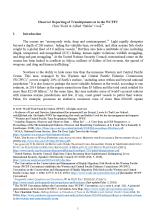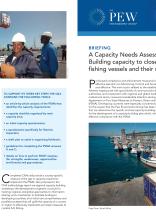Observer Reporting of Transshipments in WCPFC
The Western and Central Pacific Fisheries Commission (WCPFC) manages fishing activity in the Western and Central Pacific Oceans, one of the largest areas in the world and one of the most valuable fisheries in the world. However, their ability to enforce transshipment rules to prevent IUU fishing is severely lacking due to insufficient funds and resources, specifically when it comes to onboard observers. The observers have failed at monitoring the activities of both the fishing vessel and carrier vessel during transshipment and reporting that information for independent verification. By adopting rules already in use by other t-RFMOs, the WCPF can significantly improve its current transshipment regime.
Topic
Language

